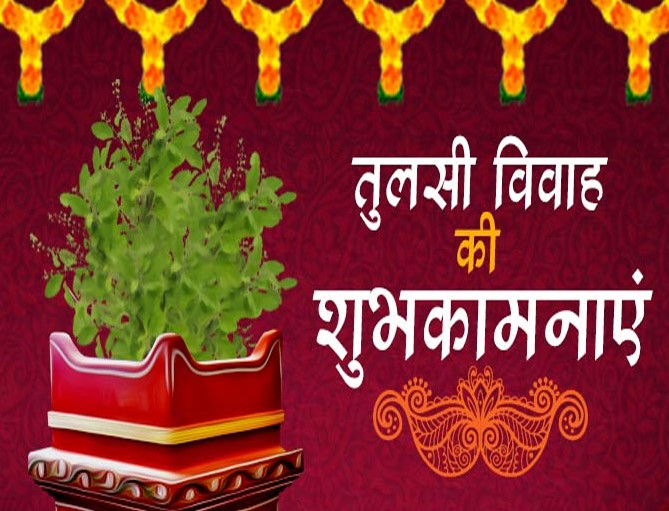In the heart of autumn, as the fragrance of blooming flowers fills the air, the auspicious occasion of Tulsi Vivah unfolds, symbolizing the sacred union between Lord Vishnu and Tulsi Devi. This timeless ritual, celebrated with reverence and devotion, is a testament to the deep spiritual connections embedded in Hindu culture.
The Significance of Tulsi Vivah:
Tulsi Vivah, typically observed on the Ekadashi (eleventh day) of the Kartik month, marks the ceremonial marriage of the Tulsi plant (holy basil) to Lord Vishnu. It signifies the end of the monsoon season and the beginning of the wedding season in Hindu culture.
The Rituals:
- Tulsi Plant Preparation: Devotees meticulously prepare the Tulsi plant for the wedding, adorning it with flowers, colorful threads, and ornaments. The plant is often placed in a specially decorated area.
- Wedding Ceremony: The marriage ceremony is performed with great devotion. A miniature idol or image of Lord Vishnu is symbolically wedded to the Tulsi plant amidst Vedic chants and prayers.
- Feast and Festivities: Devotees celebrate Tulsi Vivah by preparing delicious meals, especially sweets and delicacies. The atmosphere is infused with joy as families come together to partake in the festive feast.
The Spiritual Symbolism:
- Union of Divine Energies: Tulsi Vivah symbolizes the divine union of Lord Vishnu and Tulsi Devi. Tulsi is revered as an earthly manifestation of the goddess, and the union represents the harmonious blending of divine energies.
- Purification and Blessings: The marriage ceremony is believed to purify the surroundings and bestow blessings on the devotees. Tulsi, considered a sacred plant, is believed to have numerous medicinal and spiritual benefits.
Cultural Reverence:
Tulsi Vivah holds immense cultural and spiritual significance in Hinduism. The Tulsi plant is considered auspicious, and its leaves are used in various religious ceremonies. The ceremony is not just a ritual but a cultural celebration that reinforces the importance of nature in spiritual practices.
Tulsi Vivah in Modern Times:
While rooted in tradition, Tulsi Vivah has evolved with time. Devotees now celebrate this auspicious occasion with elaborate decorations, traditional music, and community gatherings. The essence of the ceremony remains unchanged – a celebration of divinity, nature, and the eternal bond between Lord Vishnu and Tulsi Devi.
Conclusion:
Tulsi Vivah is not just a marriage ceremony; it is a sacred symphony that resonates with the harmony between the divine and the earthly. As the sacred Tulsi plant is wedded to Lord Vishnu, the celebration echoes through the realms of spirituality, culture, and tradition.
May the sacred union of Tulsi Vivah bring blessings, prosperity, and spiritual growth to all devotees!
🌿🙏✨


